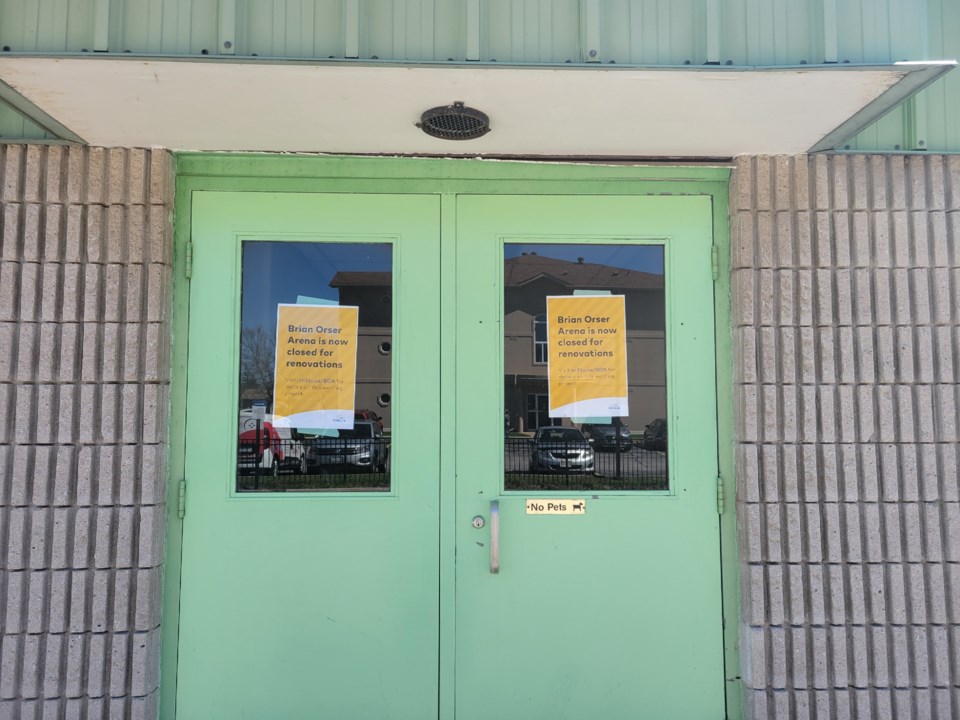The city is doubling its municipal debt to help fund two major civic projects.
At a meeting this week, council endorsed a plan to take out almost $20 million in long-term debentures to pay for the renovations at Brian Orser Arena and the second phase of the Laclie Street reconstruction project.
That $19.6 million will be added to the city’s current outstanding long-term debt balance for existing projects, which is $20,663,021.
The service cost (principal and interest) for the newly approved loan amounts to about $4.1 million a year — something that didn’t sit well with Coun. Tim Lauer, who questioned why the move was termed “good news” in a staff report.
He said the $4-million annual interest payment is “fairly significant in my book,” noting “that can’t possibly be a positive thing or have a positive effect on your reserves.”
Tatiana Johnson, the city’s deputy treasurer, explained that long-term borrowing is used so the city is “able to afford the capital infrastructure that we have planned,” noting it’s a “balancing act” financially.
“We evaluate our reserve balances to determine which reserve balances are going to go into a significant negative position to be able to afford the 10-year forecast plan,” she explained.
“And so not only does it allow us to maintain our reserve balances to afford the capital forecast plan; it also allows us to smooth out the impact of a large capital project so that we’re not taking a big impact to the reserve of, you know, $9 million, $12 million, etc.
“It's a balancing act between the requirements of the 10-year capital program as well as the cash balances that we have on hand.”
Coun. David Campbell compared the city’s strategy to an approach a homeowner might take when faced with major repairs.
In an “ideal world,” he said, a homeowner would put money aside annually for 10 years, for example, to fund a new roof.
“In an ideal world, every year, we would contribute to our reserves an equal amount that we’re going to need in the 10-year capital forecast,” said the Ward 1 councillor.
But the city has not done that. He noted the city is facing a “$250-million shortfall of funding (for) our 10-year capital” plan.
“So, we could look at that and say ... we need to put $25 million a year in our reserves (for 10 years),” he explained, stressing he was using “simplistic” terms.
“Of course, that’s not possible, because the amount of tax increase that that would represent makes it so that we simply could not do that,” said Campbell.
“So, the alternative, just like at home, is to borrow the money when you need to do something major. Does that add to the cost? Absolutely, you have to service that debt. You pay interest. It’s going to cost us more,” he noted.
“Otherwise, we simply wouldn't be able to” complete these major projects.
Lauer, a longtime local real estate agent, said he understands the concept.
“What concerns me about this whole strategy is it’s not the debt, it’s the debt service” costs, he said, noting there’s no tax increase planned to cover those costs.
"That, to me, I think is a mistake, because it seems to me we’re just spending our savings to cover the debt service and getting ourselves into eventual trouble,” he said.
“I mean, it’s a great day today because we’ve got the money in the reserves to pay that, but at some point, it’s going to affect the reserve,” said Lauer, who suggested it may be time to be “a little bit more aggressive about attacking the debt service … with our tax levy as opposed to artificially sort of paying it down.”
Johnson said the interest is factored into reserve balances and funding.
“When we forecast our capital program and we forecast our debt that we’re going to have to pay, we’re taking into consideration the requirements that we need to pay for the principle and for the interest,” she explained.
“So, when those payments are due, we draw that exact amount to cover the principle and the interest from those reserves, so we take that all into consideration.”
The two major projects that will be funded via debentures were approved during last year’s budget deliberations as part of the 2024 capital program.
The second phase of the Laclie Street reconstruction project includes work from Cedar Street to Parkhurst Crescent. The work will address the deteriorated condition of the road and underground services, including replacement of existing water mains, storm and sanitary sewers, the replacement and installation of sidewalks on both sides of the street, as well as the addition of bike lanes from North Street to Parkhurst Crescent.
The original budget for this was $9.95 million. However, staff now predict the work will cost $7.2 million, which is the amount of the debenture.
Renovations at Brian Orser Arena will extend the life of the Gill Street facility by 20 to 25 years, staff predict.
The renovation project involves the replacement of the ice surface pad, an overhaul of the refrigeration system, replacement of rink boards, glass, players’ benches and bleachers, additions to meeting rooms and change rooms, a new roof, energy-efficiency upgrades and more.
While concerns were expressed about the city’s rising debt, according to a staff report, the city’s current debt level remains “relatively low” compared to other municipalities.
“According to the latest BMA Report (an annual comparative study of municipalities), Orillia’s debt measures 2.6 per cent of own-source revenues, which is below the 4.8 per cent average for municipalities in Simcoe County. In comparison, municipalities such as Barrie, Innisfil, and New Tecumseth reflect debt ratios of 9.9 per cent, 3.3 per cent, and 13.7 per cent, respectively.”
